Legal Advice on Construction Contract Delays
VerifiedAdded on 2022/09/02
|13
|3803
|14
AI Summary
Contribute Materials
Your contribution can guide someone’s learning journey. Share your
documents today.
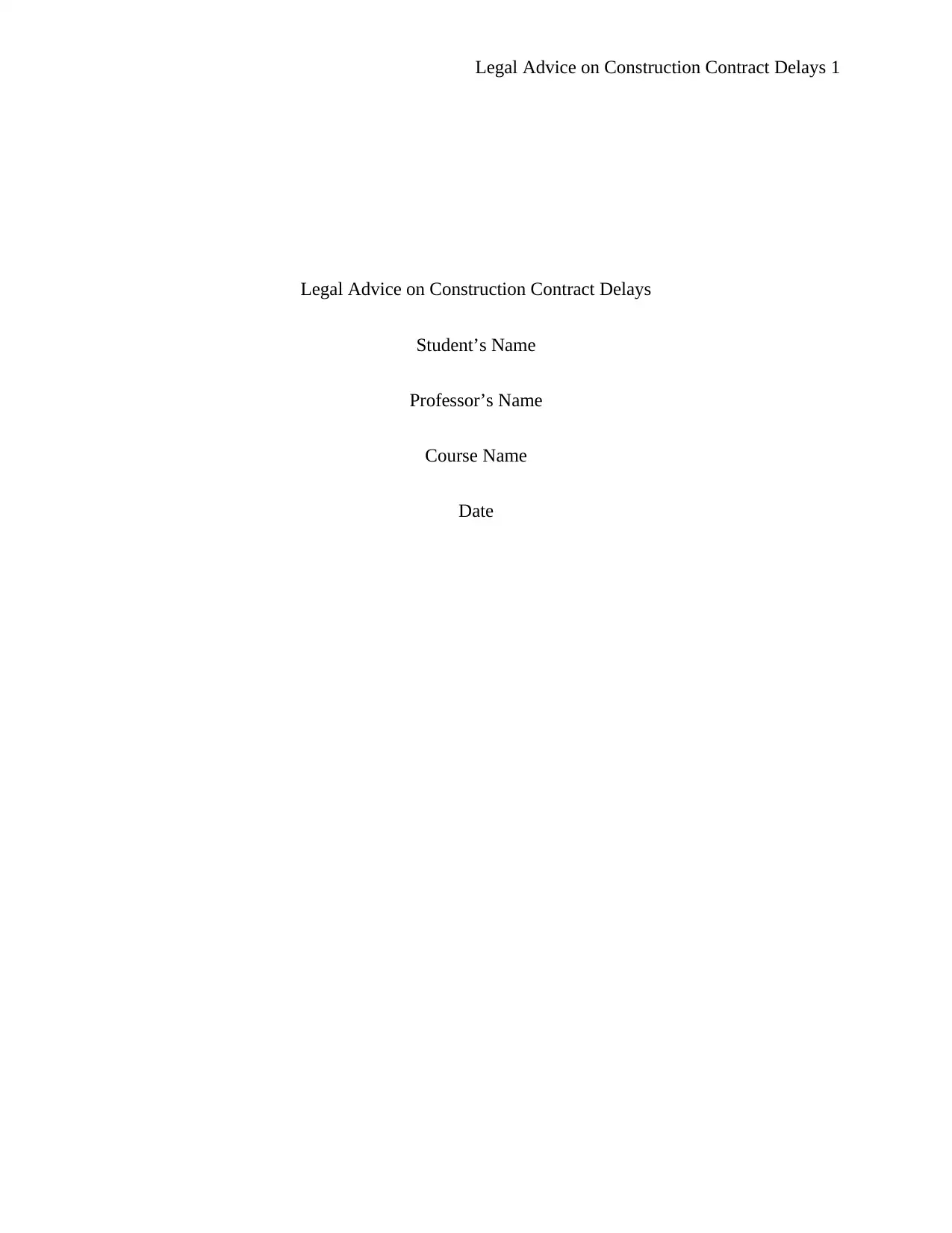
Legal Advice on Construction Contract Delays 1
Legal Advice on Construction Contract Delays
Student’s Name
Professor’s Name
Course Name
Date
Legal Advice on Construction Contract Delays
Student’s Name
Professor’s Name
Course Name
Date
Secure Best Marks with AI Grader
Need help grading? Try our AI Grader for instant feedback on your assignments.
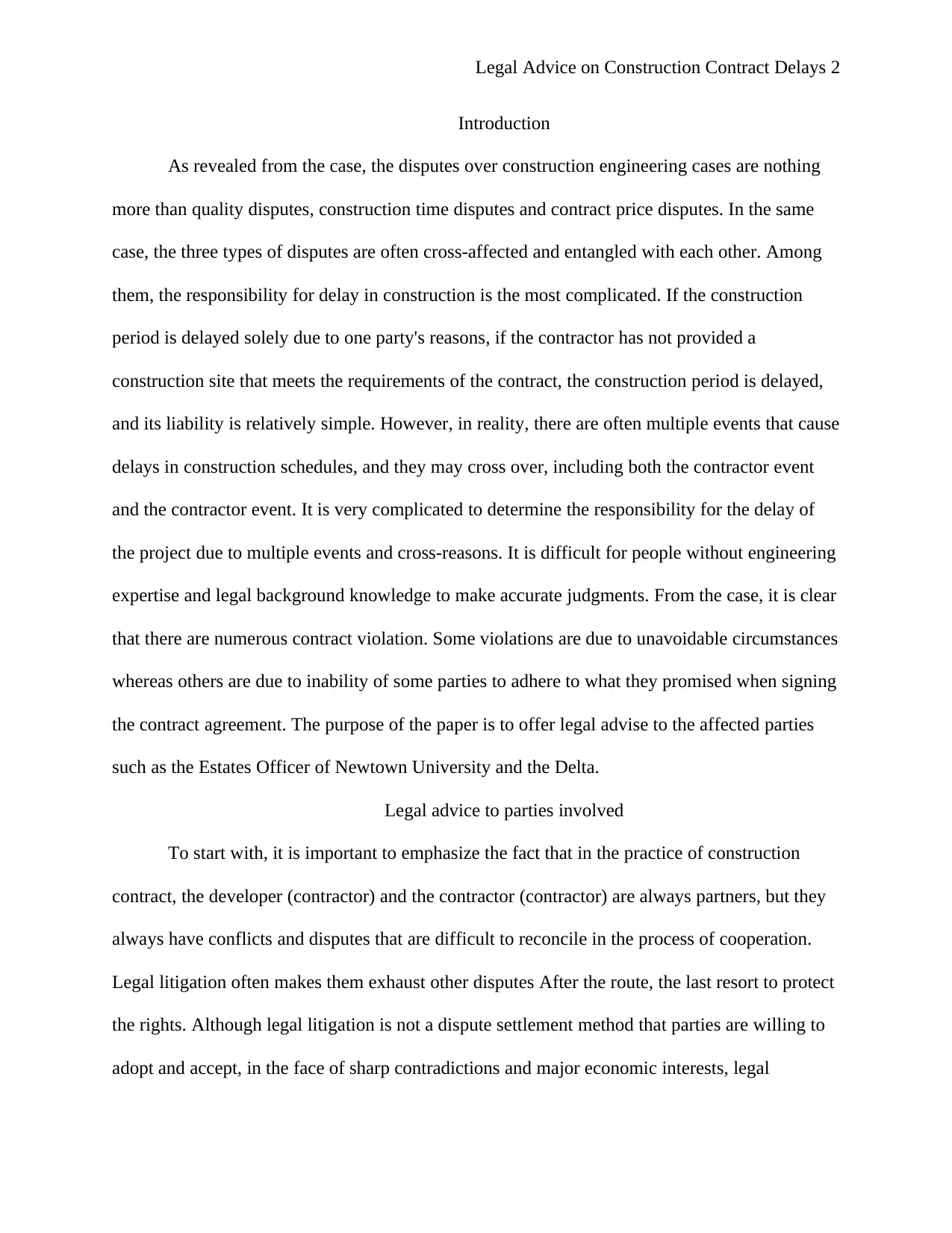
Legal Advice on Construction Contract Delays 2
Introduction
As revealed from the case, the disputes over construction engineering cases are nothing
more than quality disputes, construction time disputes and contract price disputes. In the same
case, the three types of disputes are often cross-affected and entangled with each other. Among
them, the responsibility for delay in construction is the most complicated. If the construction
period is delayed solely due to one party's reasons, if the contractor has not provided a
construction site that meets the requirements of the contract, the construction period is delayed,
and its liability is relatively simple. However, in reality, there are often multiple events that cause
delays in construction schedules, and they may cross over, including both the contractor event
and the contractor event. It is very complicated to determine the responsibility for the delay of
the project due to multiple events and cross-reasons. It is difficult for people without engineering
expertise and legal background knowledge to make accurate judgments. From the case, it is clear
that there are numerous contract violation. Some violations are due to unavoidable circumstances
whereas others are due to inability of some parties to adhere to what they promised when signing
the contract agreement. The purpose of the paper is to offer legal advise to the affected parties
such as the Estates Officer of Newtown University and the Delta.
Legal advice to parties involved
To start with, it is important to emphasize the fact that in the practice of construction
contract, the developer (contractor) and the contractor (contractor) are always partners, but they
always have conflicts and disputes that are difficult to reconcile in the process of cooperation.
Legal litigation often makes them exhaust other disputes After the route, the last resort to protect
the rights. Although legal litigation is not a dispute settlement method that parties are willing to
adopt and accept, in the face of sharp contradictions and major economic interests, legal
Introduction
As revealed from the case, the disputes over construction engineering cases are nothing
more than quality disputes, construction time disputes and contract price disputes. In the same
case, the three types of disputes are often cross-affected and entangled with each other. Among
them, the responsibility for delay in construction is the most complicated. If the construction
period is delayed solely due to one party's reasons, if the contractor has not provided a
construction site that meets the requirements of the contract, the construction period is delayed,
and its liability is relatively simple. However, in reality, there are often multiple events that cause
delays in construction schedules, and they may cross over, including both the contractor event
and the contractor event. It is very complicated to determine the responsibility for the delay of
the project due to multiple events and cross-reasons. It is difficult for people without engineering
expertise and legal background knowledge to make accurate judgments. From the case, it is clear
that there are numerous contract violation. Some violations are due to unavoidable circumstances
whereas others are due to inability of some parties to adhere to what they promised when signing
the contract agreement. The purpose of the paper is to offer legal advise to the affected parties
such as the Estates Officer of Newtown University and the Delta.
Legal advice to parties involved
To start with, it is important to emphasize the fact that in the practice of construction
contract, the developer (contractor) and the contractor (contractor) are always partners, but they
always have conflicts and disputes that are difficult to reconcile in the process of cooperation.
Legal litigation often makes them exhaust other disputes After the route, the last resort to protect
the rights. Although legal litigation is not a dispute settlement method that parties are willing to
adopt and accept, in the face of sharp contradictions and major economic interests, legal
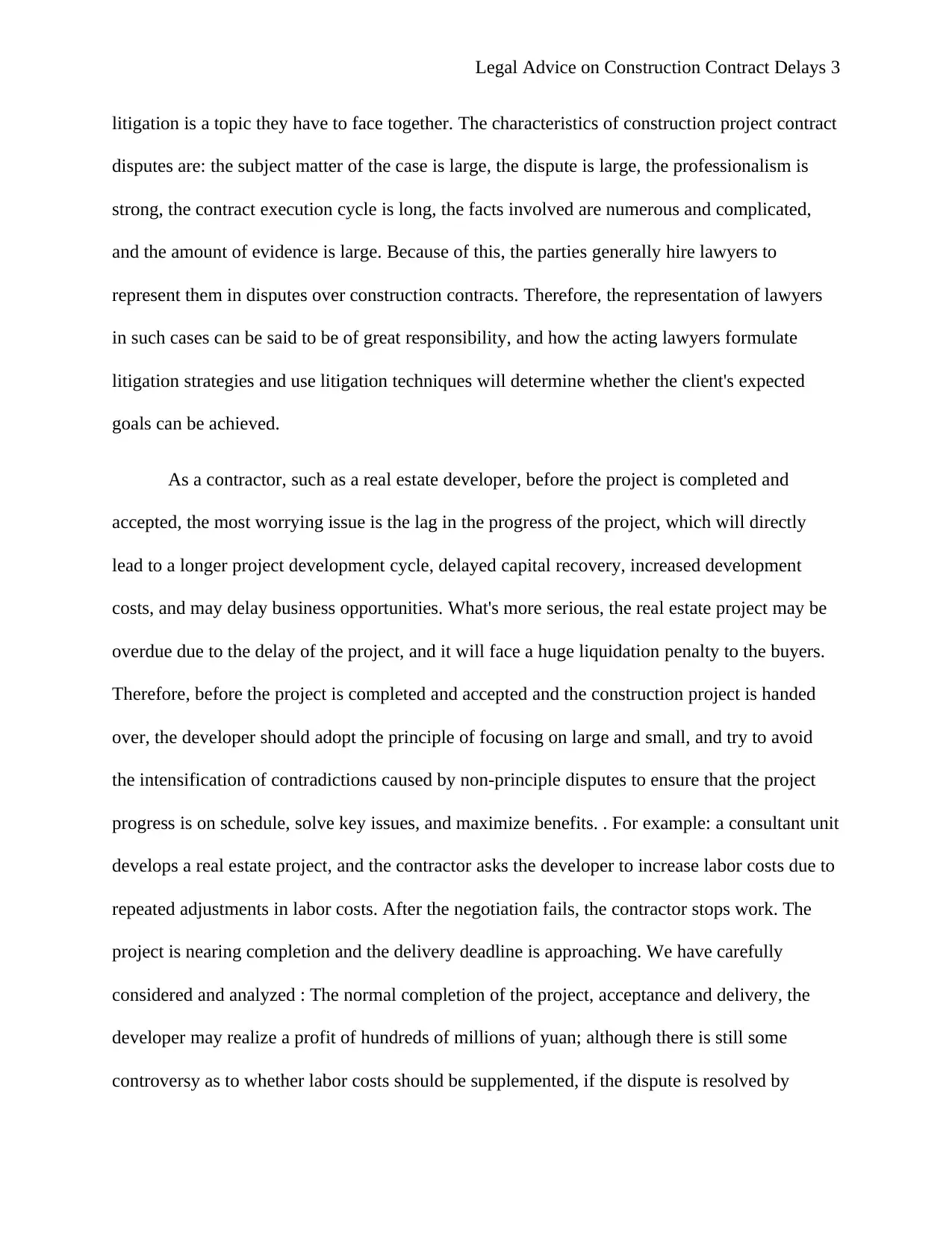
Legal Advice on Construction Contract Delays 3
litigation is a topic they have to face together. The characteristics of construction project contract
disputes are: the subject matter of the case is large, the dispute is large, the professionalism is
strong, the contract execution cycle is long, the facts involved are numerous and complicated,
and the amount of evidence is large. Because of this, the parties generally hire lawyers to
represent them in disputes over construction contracts. Therefore, the representation of lawyers
in such cases can be said to be of great responsibility, and how the acting lawyers formulate
litigation strategies and use litigation techniques will determine whether the client's expected
goals can be achieved.
As a contractor, such as a real estate developer, before the project is completed and
accepted, the most worrying issue is the lag in the progress of the project, which will directly
lead to a longer project development cycle, delayed capital recovery, increased development
costs, and may delay business opportunities. What's more serious, the real estate project may be
overdue due to the delay of the project, and it will face a huge liquidation penalty to the buyers.
Therefore, before the project is completed and accepted and the construction project is handed
over, the developer should adopt the principle of focusing on large and small, and try to avoid
the intensification of contradictions caused by non-principle disputes to ensure that the project
progress is on schedule, solve key issues, and maximize benefits. . For example: a consultant unit
develops a real estate project, and the contractor asks the developer to increase labor costs due to
repeated adjustments in labor costs. After the negotiation fails, the contractor stops work. The
project is nearing completion and the delivery deadline is approaching. We have carefully
considered and analyzed : The normal completion of the project, acceptance and delivery, the
developer may realize a profit of hundreds of millions of yuan; although there is still some
controversy as to whether labor costs should be supplemented, if the dispute is resolved by
litigation is a topic they have to face together. The characteristics of construction project contract
disputes are: the subject matter of the case is large, the dispute is large, the professionalism is
strong, the contract execution cycle is long, the facts involved are numerous and complicated,
and the amount of evidence is large. Because of this, the parties generally hire lawyers to
represent them in disputes over construction contracts. Therefore, the representation of lawyers
in such cases can be said to be of great responsibility, and how the acting lawyers formulate
litigation strategies and use litigation techniques will determine whether the client's expected
goals can be achieved.
As a contractor, such as a real estate developer, before the project is completed and
accepted, the most worrying issue is the lag in the progress of the project, which will directly
lead to a longer project development cycle, delayed capital recovery, increased development
costs, and may delay business opportunities. What's more serious, the real estate project may be
overdue due to the delay of the project, and it will face a huge liquidation penalty to the buyers.
Therefore, before the project is completed and accepted and the construction project is handed
over, the developer should adopt the principle of focusing on large and small, and try to avoid
the intensification of contradictions caused by non-principle disputes to ensure that the project
progress is on schedule, solve key issues, and maximize benefits. . For example: a consultant unit
develops a real estate project, and the contractor asks the developer to increase labor costs due to
repeated adjustments in labor costs. After the negotiation fails, the contractor stops work. The
project is nearing completion and the delivery deadline is approaching. We have carefully
considered and analyzed : The normal completion of the project, acceptance and delivery, the
developer may realize a profit of hundreds of millions of yuan; although there is still some
controversy as to whether labor costs should be supplemented, if the dispute is resolved by
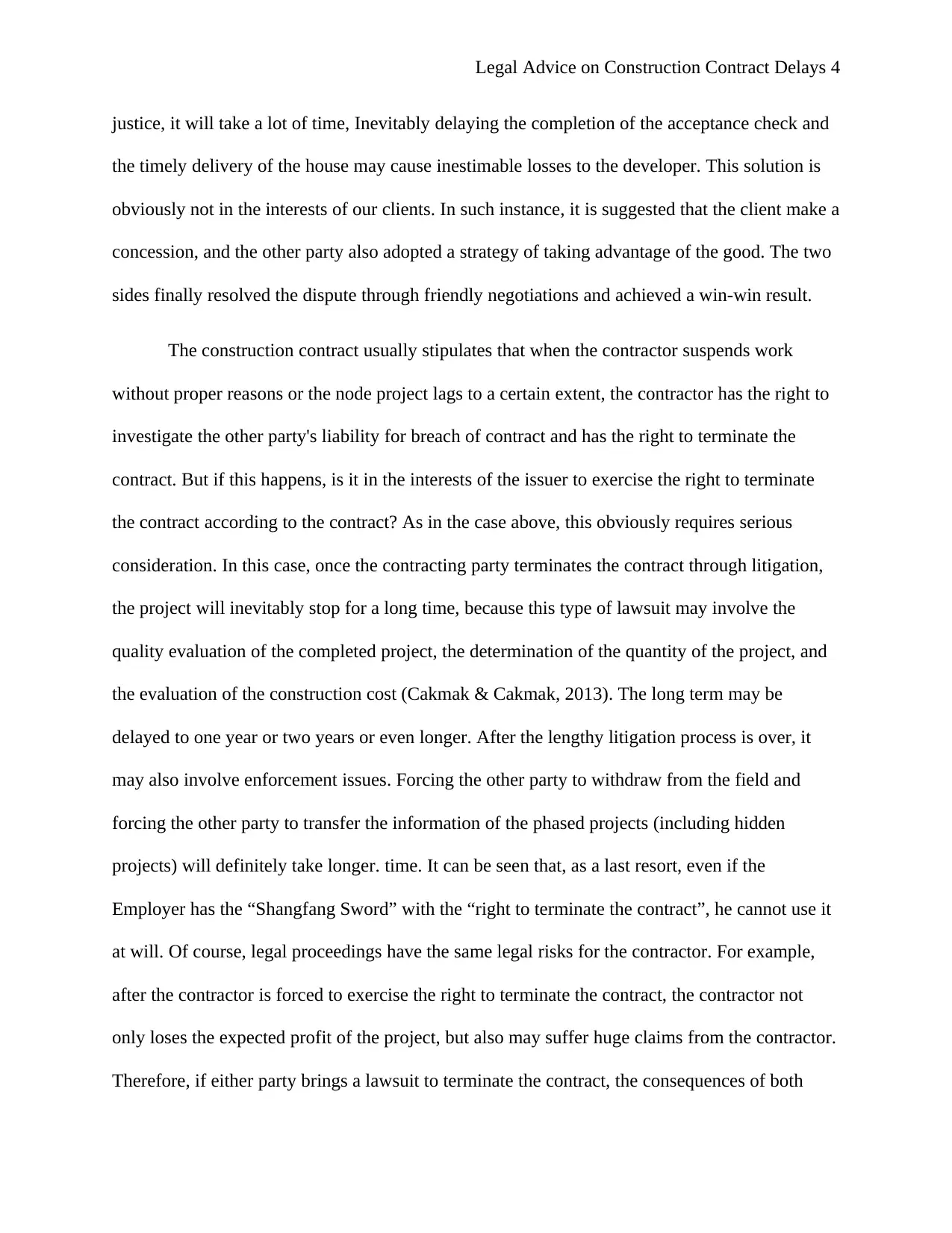
Legal Advice on Construction Contract Delays 4
justice, it will take a lot of time, Inevitably delaying the completion of the acceptance check and
the timely delivery of the house may cause inestimable losses to the developer. This solution is
obviously not in the interests of our clients. In such instance, it is suggested that the client make a
concession, and the other party also adopted a strategy of taking advantage of the good. The two
sides finally resolved the dispute through friendly negotiations and achieved a win-win result.
The construction contract usually stipulates that when the contractor suspends work
without proper reasons or the node project lags to a certain extent, the contractor has the right to
investigate the other party's liability for breach of contract and has the right to terminate the
contract. But if this happens, is it in the interests of the issuer to exercise the right to terminate
the contract according to the contract? As in the case above, this obviously requires serious
consideration. In this case, once the contracting party terminates the contract through litigation,
the project will inevitably stop for a long time, because this type of lawsuit may involve the
quality evaluation of the completed project, the determination of the quantity of the project, and
the evaluation of the construction cost (Cakmak & Cakmak, 2013). The long term may be
delayed to one year or two years or even longer. After the lengthy litigation process is over, it
may also involve enforcement issues. Forcing the other party to withdraw from the field and
forcing the other party to transfer the information of the phased projects (including hidden
projects) will definitely take longer. time. It can be seen that, as a last resort, even if the
Employer has the “Shangfang Sword” with the “right to terminate the contract”, he cannot use it
at will. Of course, legal proceedings have the same legal risks for the contractor. For example,
after the contractor is forced to exercise the right to terminate the contract, the contractor not
only loses the expected profit of the project, but also may suffer huge claims from the contractor.
Therefore, if either party brings a lawsuit to terminate the contract, the consequences of both
justice, it will take a lot of time, Inevitably delaying the completion of the acceptance check and
the timely delivery of the house may cause inestimable losses to the developer. This solution is
obviously not in the interests of our clients. In such instance, it is suggested that the client make a
concession, and the other party also adopted a strategy of taking advantage of the good. The two
sides finally resolved the dispute through friendly negotiations and achieved a win-win result.
The construction contract usually stipulates that when the contractor suspends work
without proper reasons or the node project lags to a certain extent, the contractor has the right to
investigate the other party's liability for breach of contract and has the right to terminate the
contract. But if this happens, is it in the interests of the issuer to exercise the right to terminate
the contract according to the contract? As in the case above, this obviously requires serious
consideration. In this case, once the contracting party terminates the contract through litigation,
the project will inevitably stop for a long time, because this type of lawsuit may involve the
quality evaluation of the completed project, the determination of the quantity of the project, and
the evaluation of the construction cost (Cakmak & Cakmak, 2013). The long term may be
delayed to one year or two years or even longer. After the lengthy litigation process is over, it
may also involve enforcement issues. Forcing the other party to withdraw from the field and
forcing the other party to transfer the information of the phased projects (including hidden
projects) will definitely take longer. time. It can be seen that, as a last resort, even if the
Employer has the “Shangfang Sword” with the “right to terminate the contract”, he cannot use it
at will. Of course, legal proceedings have the same legal risks for the contractor. For example,
after the contractor is forced to exercise the right to terminate the contract, the contractor not
only loses the expected profit of the project, but also may suffer huge claims from the contractor.
Therefore, if either party brings a lawsuit to terminate the contract, the consequences of both
Secure Best Marks with AI Grader
Need help grading? Try our AI Grader for instant feedback on your assignments.
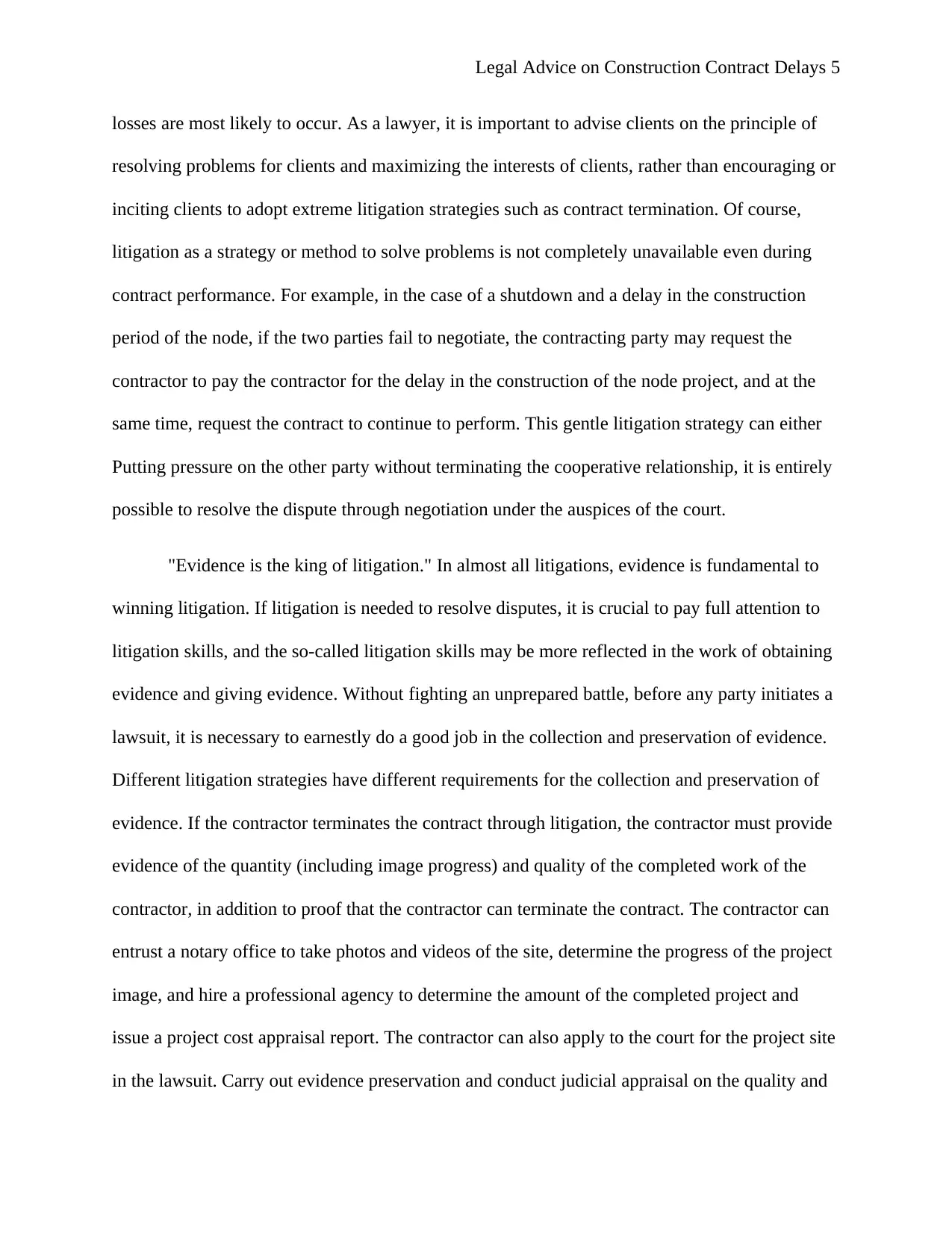
Legal Advice on Construction Contract Delays 5
losses are most likely to occur. As a lawyer, it is important to advise clients on the principle of
resolving problems for clients and maximizing the interests of clients, rather than encouraging or
inciting clients to adopt extreme litigation strategies such as contract termination. Of course,
litigation as a strategy or method to solve problems is not completely unavailable even during
contract performance. For example, in the case of a shutdown and a delay in the construction
period of the node, if the two parties fail to negotiate, the contracting party may request the
contractor to pay the contractor for the delay in the construction of the node project, and at the
same time, request the contract to continue to perform. This gentle litigation strategy can either
Putting pressure on the other party without terminating the cooperative relationship, it is entirely
possible to resolve the dispute through negotiation under the auspices of the court.
"Evidence is the king of litigation." In almost all litigations, evidence is fundamental to
winning litigation. If litigation is needed to resolve disputes, it is crucial to pay full attention to
litigation skills, and the so-called litigation skills may be more reflected in the work of obtaining
evidence and giving evidence. Without fighting an unprepared battle, before any party initiates a
lawsuit, it is necessary to earnestly do a good job in the collection and preservation of evidence.
Different litigation strategies have different requirements for the collection and preservation of
evidence. If the contractor terminates the contract through litigation, the contractor must provide
evidence of the quantity (including image progress) and quality of the completed work of the
contractor, in addition to proof that the contractor can terminate the contract. The contractor can
entrust a notary office to take photos and videos of the site, determine the progress of the project
image, and hire a professional agency to determine the amount of the completed project and
issue a project cost appraisal report. The contractor can also apply to the court for the project site
in the lawsuit. Carry out evidence preservation and conduct judicial appraisal on the quality and
losses are most likely to occur. As a lawyer, it is important to advise clients on the principle of
resolving problems for clients and maximizing the interests of clients, rather than encouraging or
inciting clients to adopt extreme litigation strategies such as contract termination. Of course,
litigation as a strategy or method to solve problems is not completely unavailable even during
contract performance. For example, in the case of a shutdown and a delay in the construction
period of the node, if the two parties fail to negotiate, the contracting party may request the
contractor to pay the contractor for the delay in the construction of the node project, and at the
same time, request the contract to continue to perform. This gentle litigation strategy can either
Putting pressure on the other party without terminating the cooperative relationship, it is entirely
possible to resolve the dispute through negotiation under the auspices of the court.
"Evidence is the king of litigation." In almost all litigations, evidence is fundamental to
winning litigation. If litigation is needed to resolve disputes, it is crucial to pay full attention to
litigation skills, and the so-called litigation skills may be more reflected in the work of obtaining
evidence and giving evidence. Without fighting an unprepared battle, before any party initiates a
lawsuit, it is necessary to earnestly do a good job in the collection and preservation of evidence.
Different litigation strategies have different requirements for the collection and preservation of
evidence. If the contractor terminates the contract through litigation, the contractor must provide
evidence of the quantity (including image progress) and quality of the completed work of the
contractor, in addition to proof that the contractor can terminate the contract. The contractor can
entrust a notary office to take photos and videos of the site, determine the progress of the project
image, and hire a professional agency to determine the amount of the completed project and
issue a project cost appraisal report. The contractor can also apply to the court for the project site
in the lawsuit. Carry out evidence preservation and conduct judicial appraisal on the quality and
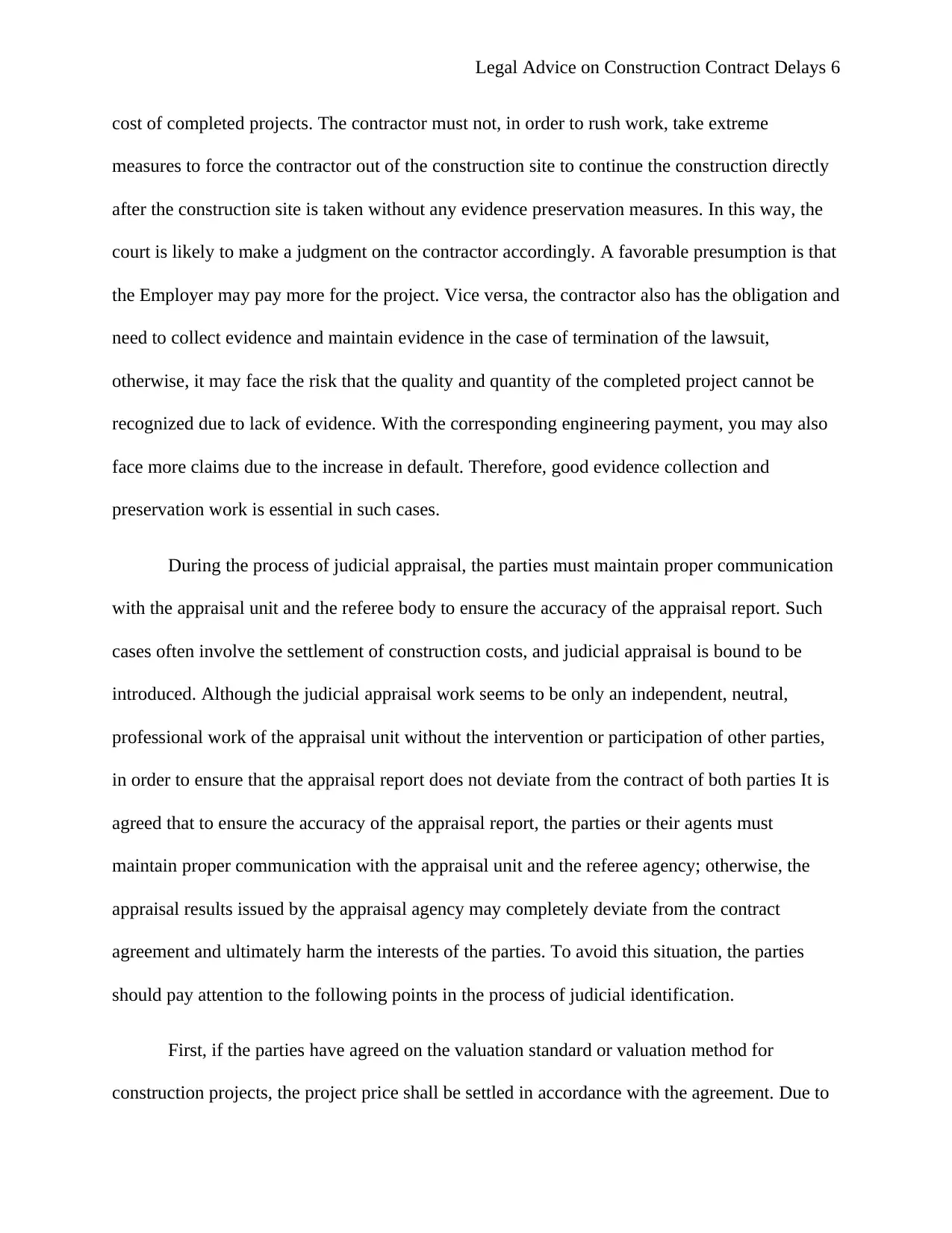
Legal Advice on Construction Contract Delays 6
cost of completed projects. The contractor must not, in order to rush work, take extreme
measures to force the contractor out of the construction site to continue the construction directly
after the construction site is taken without any evidence preservation measures. In this way, the
court is likely to make a judgment on the contractor accordingly. A favorable presumption is that
the Employer may pay more for the project. Vice versa, the contractor also has the obligation and
need to collect evidence and maintain evidence in the case of termination of the lawsuit,
otherwise, it may face the risk that the quality and quantity of the completed project cannot be
recognized due to lack of evidence. With the corresponding engineering payment, you may also
face more claims due to the increase in default. Therefore, good evidence collection and
preservation work is essential in such cases.
During the process of judicial appraisal, the parties must maintain proper communication
with the appraisal unit and the referee body to ensure the accuracy of the appraisal report. Such
cases often involve the settlement of construction costs, and judicial appraisal is bound to be
introduced. Although the judicial appraisal work seems to be only an independent, neutral,
professional work of the appraisal unit without the intervention or participation of other parties,
in order to ensure that the appraisal report does not deviate from the contract of both parties It is
agreed that to ensure the accuracy of the appraisal report, the parties or their agents must
maintain proper communication with the appraisal unit and the referee agency; otherwise, the
appraisal results issued by the appraisal agency may completely deviate from the contract
agreement and ultimately harm the interests of the parties. To avoid this situation, the parties
should pay attention to the following points in the process of judicial identification.
First, if the parties have agreed on the valuation standard or valuation method for
construction projects, the project price shall be settled in accordance with the agreement. Due to
cost of completed projects. The contractor must not, in order to rush work, take extreme
measures to force the contractor out of the construction site to continue the construction directly
after the construction site is taken without any evidence preservation measures. In this way, the
court is likely to make a judgment on the contractor accordingly. A favorable presumption is that
the Employer may pay more for the project. Vice versa, the contractor also has the obligation and
need to collect evidence and maintain evidence in the case of termination of the lawsuit,
otherwise, it may face the risk that the quality and quantity of the completed project cannot be
recognized due to lack of evidence. With the corresponding engineering payment, you may also
face more claims due to the increase in default. Therefore, good evidence collection and
preservation work is essential in such cases.
During the process of judicial appraisal, the parties must maintain proper communication
with the appraisal unit and the referee body to ensure the accuracy of the appraisal report. Such
cases often involve the settlement of construction costs, and judicial appraisal is bound to be
introduced. Although the judicial appraisal work seems to be only an independent, neutral,
professional work of the appraisal unit without the intervention or participation of other parties,
in order to ensure that the appraisal report does not deviate from the contract of both parties It is
agreed that to ensure the accuracy of the appraisal report, the parties or their agents must
maintain proper communication with the appraisal unit and the referee agency; otherwise, the
appraisal results issued by the appraisal agency may completely deviate from the contract
agreement and ultimately harm the interests of the parties. To avoid this situation, the parties
should pay attention to the following points in the process of judicial identification.
First, if the parties have agreed on the valuation standard or valuation method for
construction projects, the project price shall be settled in accordance with the agreement. Due to
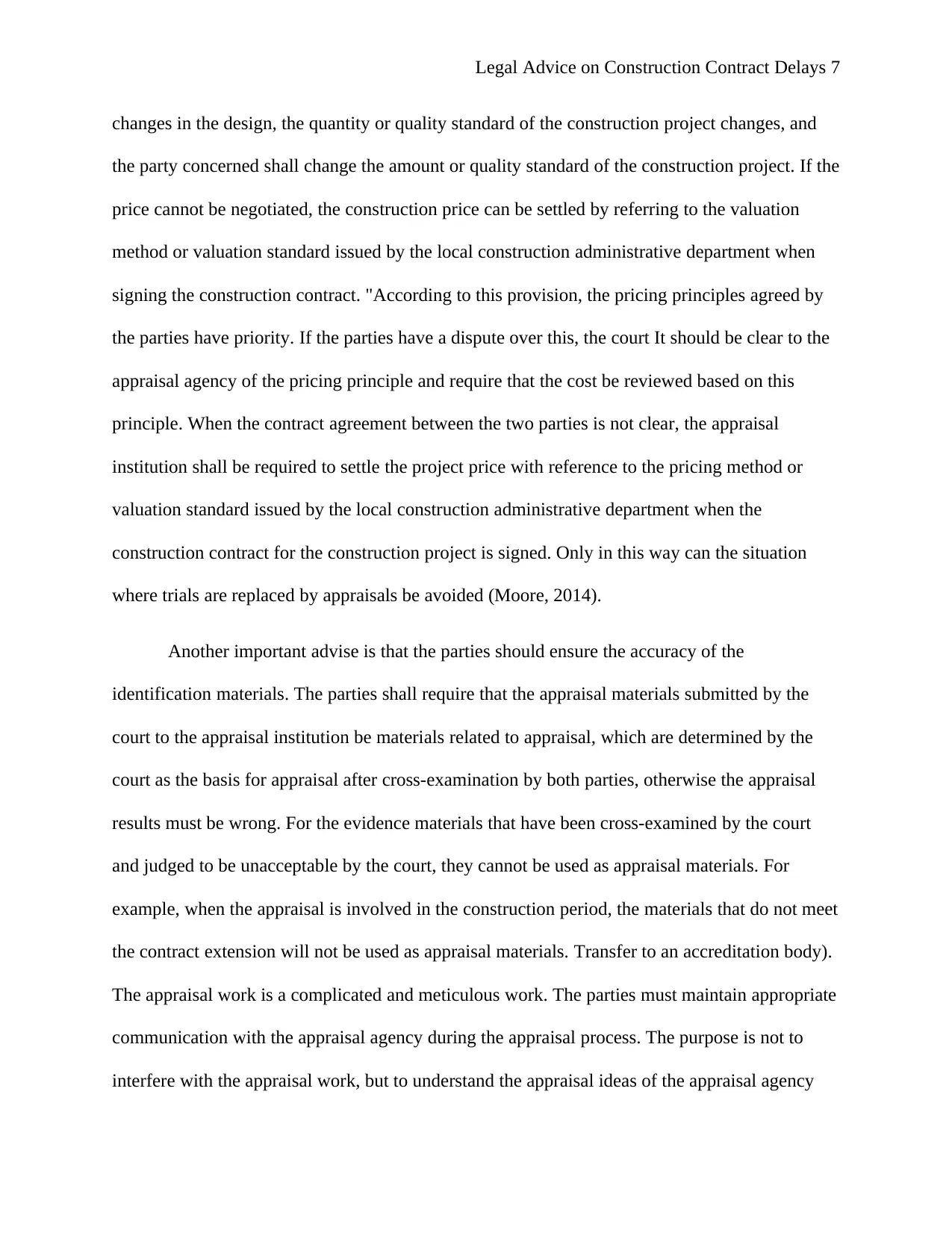
Legal Advice on Construction Contract Delays 7
changes in the design, the quantity or quality standard of the construction project changes, and
the party concerned shall change the amount or quality standard of the construction project. If the
price cannot be negotiated, the construction price can be settled by referring to the valuation
method or valuation standard issued by the local construction administrative department when
signing the construction contract. "According to this provision, the pricing principles agreed by
the parties have priority. If the parties have a dispute over this, the court It should be clear to the
appraisal agency of the pricing principle and require that the cost be reviewed based on this
principle. When the contract agreement between the two parties is not clear, the appraisal
institution shall be required to settle the project price with reference to the pricing method or
valuation standard issued by the local construction administrative department when the
construction contract for the construction project is signed. Only in this way can the situation
where trials are replaced by appraisals be avoided (Moore, 2014).
Another important advise is that the parties should ensure the accuracy of the
identification materials. The parties shall require that the appraisal materials submitted by the
court to the appraisal institution be materials related to appraisal, which are determined by the
court as the basis for appraisal after cross-examination by both parties, otherwise the appraisal
results must be wrong. For the evidence materials that have been cross-examined by the court
and judged to be unacceptable by the court, they cannot be used as appraisal materials. For
example, when the appraisal is involved in the construction period, the materials that do not meet
the contract extension will not be used as appraisal materials. Transfer to an accreditation body).
The appraisal work is a complicated and meticulous work. The parties must maintain appropriate
communication with the appraisal agency during the appraisal process. The purpose is not to
interfere with the appraisal work, but to understand the appraisal ideas of the appraisal agency
changes in the design, the quantity or quality standard of the construction project changes, and
the party concerned shall change the amount or quality standard of the construction project. If the
price cannot be negotiated, the construction price can be settled by referring to the valuation
method or valuation standard issued by the local construction administrative department when
signing the construction contract. "According to this provision, the pricing principles agreed by
the parties have priority. If the parties have a dispute over this, the court It should be clear to the
appraisal agency of the pricing principle and require that the cost be reviewed based on this
principle. When the contract agreement between the two parties is not clear, the appraisal
institution shall be required to settle the project price with reference to the pricing method or
valuation standard issued by the local construction administrative department when the
construction contract for the construction project is signed. Only in this way can the situation
where trials are replaced by appraisals be avoided (Moore, 2014).
Another important advise is that the parties should ensure the accuracy of the
identification materials. The parties shall require that the appraisal materials submitted by the
court to the appraisal institution be materials related to appraisal, which are determined by the
court as the basis for appraisal after cross-examination by both parties, otherwise the appraisal
results must be wrong. For the evidence materials that have been cross-examined by the court
and judged to be unacceptable by the court, they cannot be used as appraisal materials. For
example, when the appraisal is involved in the construction period, the materials that do not meet
the contract extension will not be used as appraisal materials. Transfer to an accreditation body).
The appraisal work is a complicated and meticulous work. The parties must maintain appropriate
communication with the appraisal agency during the appraisal process. The purpose is not to
interfere with the appraisal work, but to understand the appraisal ideas of the appraisal agency
Paraphrase This Document
Need a fresh take? Get an instant paraphrase of this document with our AI Paraphraser
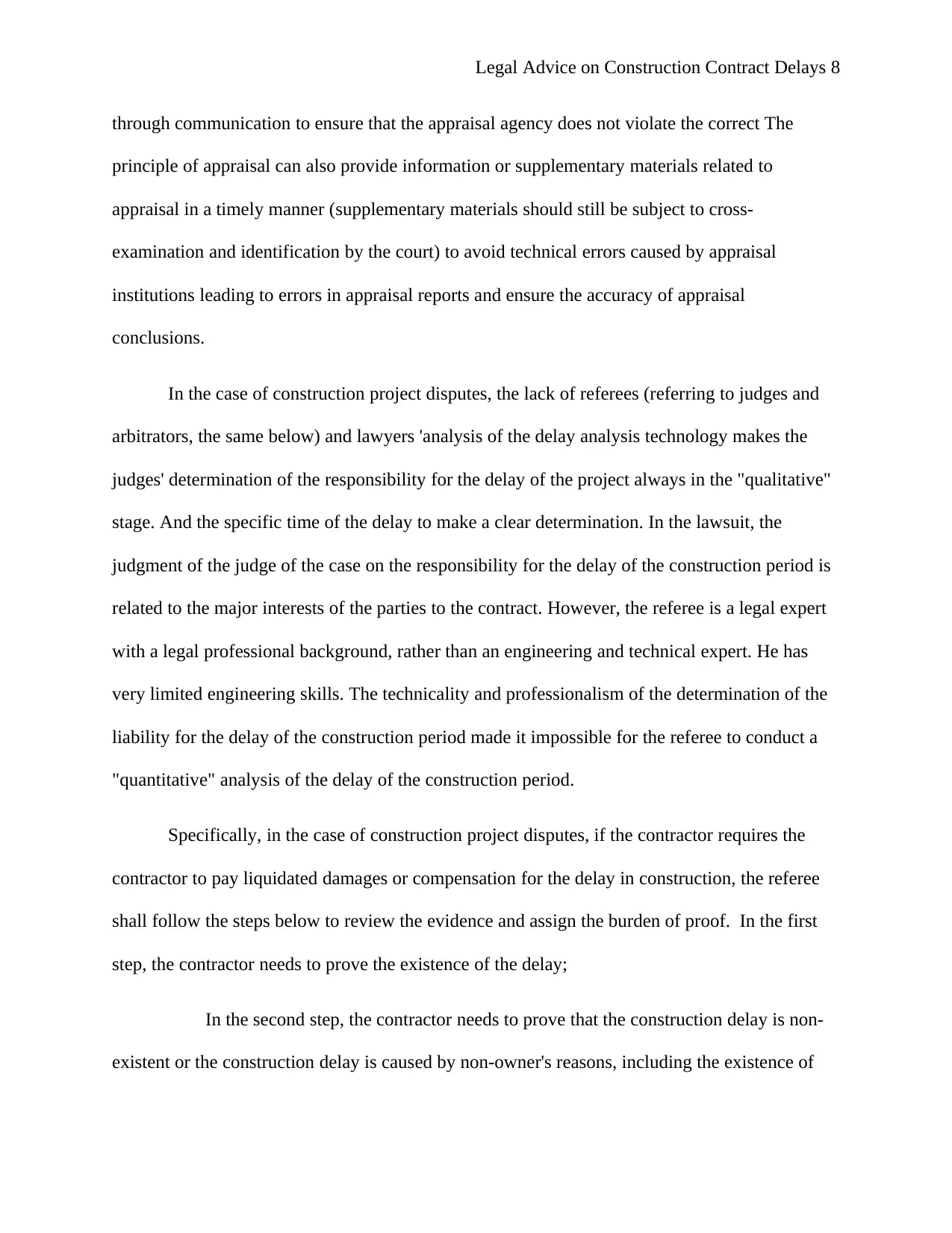
Legal Advice on Construction Contract Delays 8
through communication to ensure that the appraisal agency does not violate the correct The
principle of appraisal can also provide information or supplementary materials related to
appraisal in a timely manner (supplementary materials should still be subject to cross-
examination and identification by the court) to avoid technical errors caused by appraisal
institutions leading to errors in appraisal reports and ensure the accuracy of appraisal
conclusions.
In the case of construction project disputes, the lack of referees (referring to judges and
arbitrators, the same below) and lawyers 'analysis of the delay analysis technology makes the
judges' determination of the responsibility for the delay of the project always in the "qualitative"
stage. And the specific time of the delay to make a clear determination. In the lawsuit, the
judgment of the judge of the case on the responsibility for the delay of the construction period is
related to the major interests of the parties to the contract. However, the referee is a legal expert
with a legal professional background, rather than an engineering and technical expert. He has
very limited engineering skills. The technicality and professionalism of the determination of the
liability for the delay of the construction period made it impossible for the referee to conduct a
"quantitative" analysis of the delay of the construction period.
Specifically, in the case of construction project disputes, if the contractor requires the
contractor to pay liquidated damages or compensation for the delay in construction, the referee
shall follow the steps below to review the evidence and assign the burden of proof. In the first
step, the contractor needs to prove the existence of the delay;
In the second step, the contractor needs to prove that the construction delay is non-
existent or the construction delay is caused by non-owner's reasons, including the existence of
through communication to ensure that the appraisal agency does not violate the correct The
principle of appraisal can also provide information or supplementary materials related to
appraisal in a timely manner (supplementary materials should still be subject to cross-
examination and identification by the court) to avoid technical errors caused by appraisal
institutions leading to errors in appraisal reports and ensure the accuracy of appraisal
conclusions.
In the case of construction project disputes, the lack of referees (referring to judges and
arbitrators, the same below) and lawyers 'analysis of the delay analysis technology makes the
judges' determination of the responsibility for the delay of the project always in the "qualitative"
stage. And the specific time of the delay to make a clear determination. In the lawsuit, the
judgment of the judge of the case on the responsibility for the delay of the construction period is
related to the major interests of the parties to the contract. However, the referee is a legal expert
with a legal professional background, rather than an engineering and technical expert. He has
very limited engineering skills. The technicality and professionalism of the determination of the
liability for the delay of the construction period made it impossible for the referee to conduct a
"quantitative" analysis of the delay of the construction period.
Specifically, in the case of construction project disputes, if the contractor requires the
contractor to pay liquidated damages or compensation for the delay in construction, the referee
shall follow the steps below to review the evidence and assign the burden of proof. In the first
step, the contractor needs to prove the existence of the delay;
In the second step, the contractor needs to prove that the construction delay is non-
existent or the construction delay is caused by non-owner's reasons, including the existence of
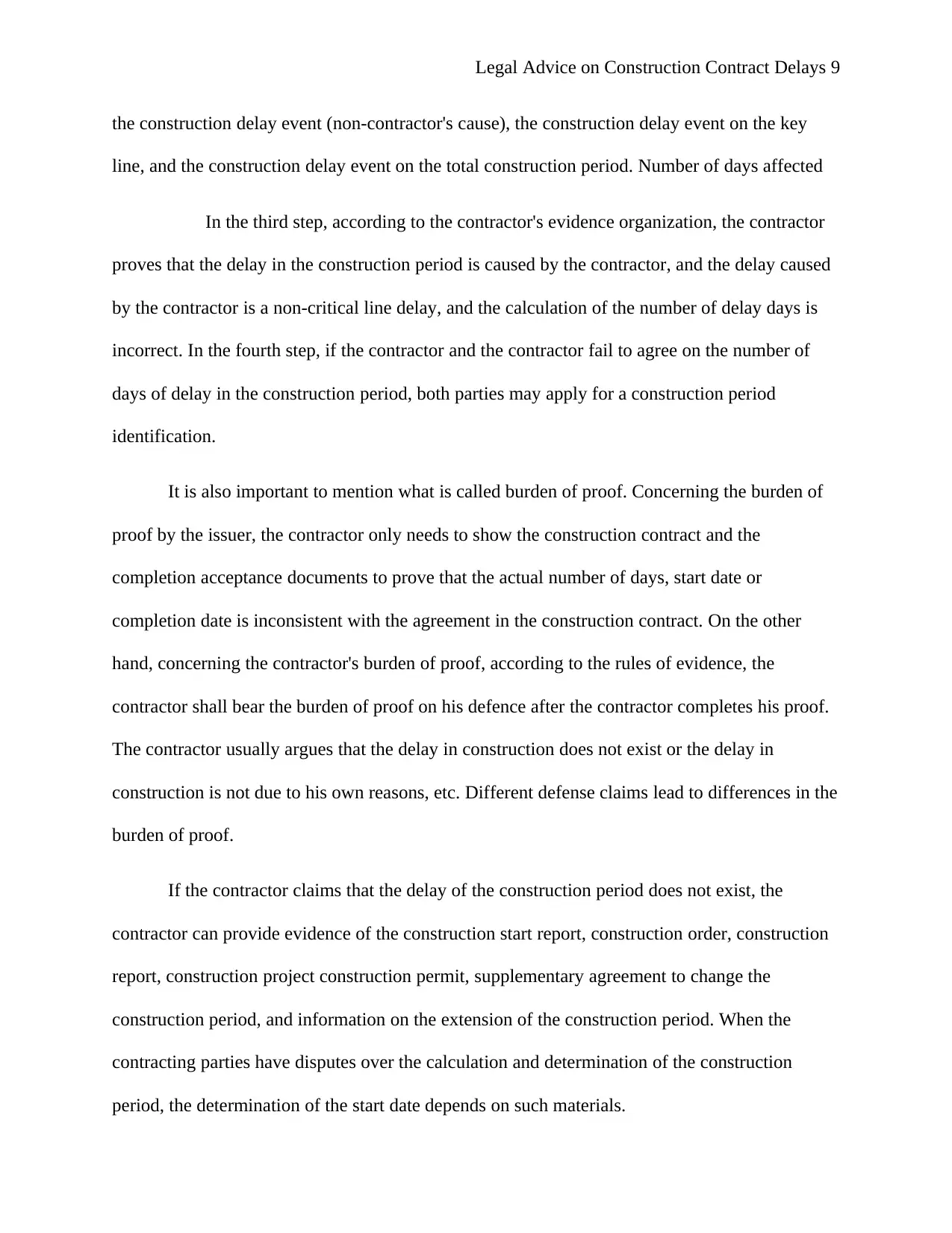
Legal Advice on Construction Contract Delays 9
the construction delay event (non-contractor's cause), the construction delay event on the key
line, and the construction delay event on the total construction period. Number of days affected
In the third step, according to the contractor's evidence organization, the contractor
proves that the delay in the construction period is caused by the contractor, and the delay caused
by the contractor is a non-critical line delay, and the calculation of the number of delay days is
incorrect. In the fourth step, if the contractor and the contractor fail to agree on the number of
days of delay in the construction period, both parties may apply for a construction period
identification.
It is also important to mention what is called burden of proof. Concerning the burden of
proof by the issuer, the contractor only needs to show the construction contract and the
completion acceptance documents to prove that the actual number of days, start date or
completion date is inconsistent with the agreement in the construction contract. On the other
hand, concerning the contractor's burden of proof, according to the rules of evidence, the
contractor shall bear the burden of proof on his defence after the contractor completes his proof.
The contractor usually argues that the delay in construction does not exist or the delay in
construction is not due to his own reasons, etc. Different defense claims lead to differences in the
burden of proof.
If the contractor claims that the delay of the construction period does not exist, the
contractor can provide evidence of the construction start report, construction order, construction
report, construction project construction permit, supplementary agreement to change the
construction period, and information on the extension of the construction period. When the
contracting parties have disputes over the calculation and determination of the construction
period, the determination of the start date depends on such materials.
the construction delay event (non-contractor's cause), the construction delay event on the key
line, and the construction delay event on the total construction period. Number of days affected
In the third step, according to the contractor's evidence organization, the contractor
proves that the delay in the construction period is caused by the contractor, and the delay caused
by the contractor is a non-critical line delay, and the calculation of the number of delay days is
incorrect. In the fourth step, if the contractor and the contractor fail to agree on the number of
days of delay in the construction period, both parties may apply for a construction period
identification.
It is also important to mention what is called burden of proof. Concerning the burden of
proof by the issuer, the contractor only needs to show the construction contract and the
completion acceptance documents to prove that the actual number of days, start date or
completion date is inconsistent with the agreement in the construction contract. On the other
hand, concerning the contractor's burden of proof, according to the rules of evidence, the
contractor shall bear the burden of proof on his defence after the contractor completes his proof.
The contractor usually argues that the delay in construction does not exist or the delay in
construction is not due to his own reasons, etc. Different defense claims lead to differences in the
burden of proof.
If the contractor claims that the delay of the construction period does not exist, the
contractor can provide evidence of the construction start report, construction order, construction
report, construction project construction permit, supplementary agreement to change the
construction period, and information on the extension of the construction period. When the
contracting parties have disputes over the calculation and determination of the construction
period, the determination of the start date depends on such materials.
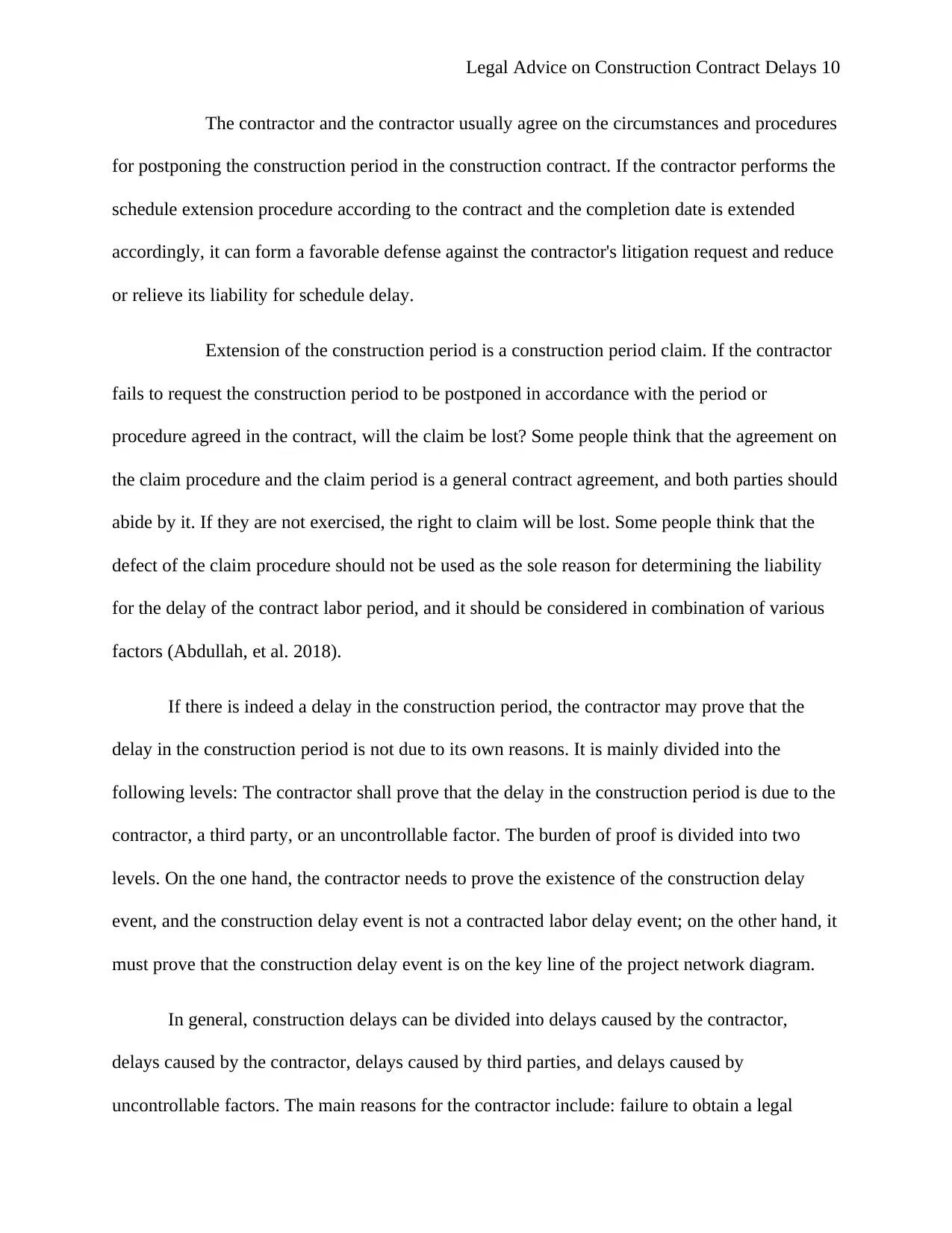
Legal Advice on Construction Contract Delays 10
The contractor and the contractor usually agree on the circumstances and procedures
for postponing the construction period in the construction contract. If the contractor performs the
schedule extension procedure according to the contract and the completion date is extended
accordingly, it can form a favorable defense against the contractor's litigation request and reduce
or relieve its liability for schedule delay.
Extension of the construction period is a construction period claim. If the contractor
fails to request the construction period to be postponed in accordance with the period or
procedure agreed in the contract, will the claim be lost? Some people think that the agreement on
the claim procedure and the claim period is a general contract agreement, and both parties should
abide by it. If they are not exercised, the right to claim will be lost. Some people think that the
defect of the claim procedure should not be used as the sole reason for determining the liability
for the delay of the contract labor period, and it should be considered in combination of various
factors (Abdullah, et al. 2018).
If there is indeed a delay in the construction period, the contractor may prove that the
delay in the construction period is not due to its own reasons. It is mainly divided into the
following levels: The contractor shall prove that the delay in the construction period is due to the
contractor, a third party, or an uncontrollable factor. The burden of proof is divided into two
levels. On the one hand, the contractor needs to prove the existence of the construction delay
event, and the construction delay event is not a contracted labor delay event; on the other hand, it
must prove that the construction delay event is on the key line of the project network diagram.
In general, construction delays can be divided into delays caused by the contractor,
delays caused by the contractor, delays caused by third parties, and delays caused by
uncontrollable factors. The main reasons for the contractor include: failure to obtain a legal
The contractor and the contractor usually agree on the circumstances and procedures
for postponing the construction period in the construction contract. If the contractor performs the
schedule extension procedure according to the contract and the completion date is extended
accordingly, it can form a favorable defense against the contractor's litigation request and reduce
or relieve its liability for schedule delay.
Extension of the construction period is a construction period claim. If the contractor
fails to request the construction period to be postponed in accordance with the period or
procedure agreed in the contract, will the claim be lost? Some people think that the agreement on
the claim procedure and the claim period is a general contract agreement, and both parties should
abide by it. If they are not exercised, the right to claim will be lost. Some people think that the
defect of the claim procedure should not be used as the sole reason for determining the liability
for the delay of the contract labor period, and it should be considered in combination of various
factors (Abdullah, et al. 2018).
If there is indeed a delay in the construction period, the contractor may prove that the
delay in the construction period is not due to its own reasons. It is mainly divided into the
following levels: The contractor shall prove that the delay in the construction period is due to the
contractor, a third party, or an uncontrollable factor. The burden of proof is divided into two
levels. On the one hand, the contractor needs to prove the existence of the construction delay
event, and the construction delay event is not a contracted labor delay event; on the other hand, it
must prove that the construction delay event is on the key line of the project network diagram.
In general, construction delays can be divided into delays caused by the contractor,
delays caused by the contractor, delays caused by third parties, and delays caused by
uncontrollable factors. The main reasons for the contractor include: failure to obtain a legal
Secure Best Marks with AI Grader
Need help grading? Try our AI Grader for instant feedback on your assignments.
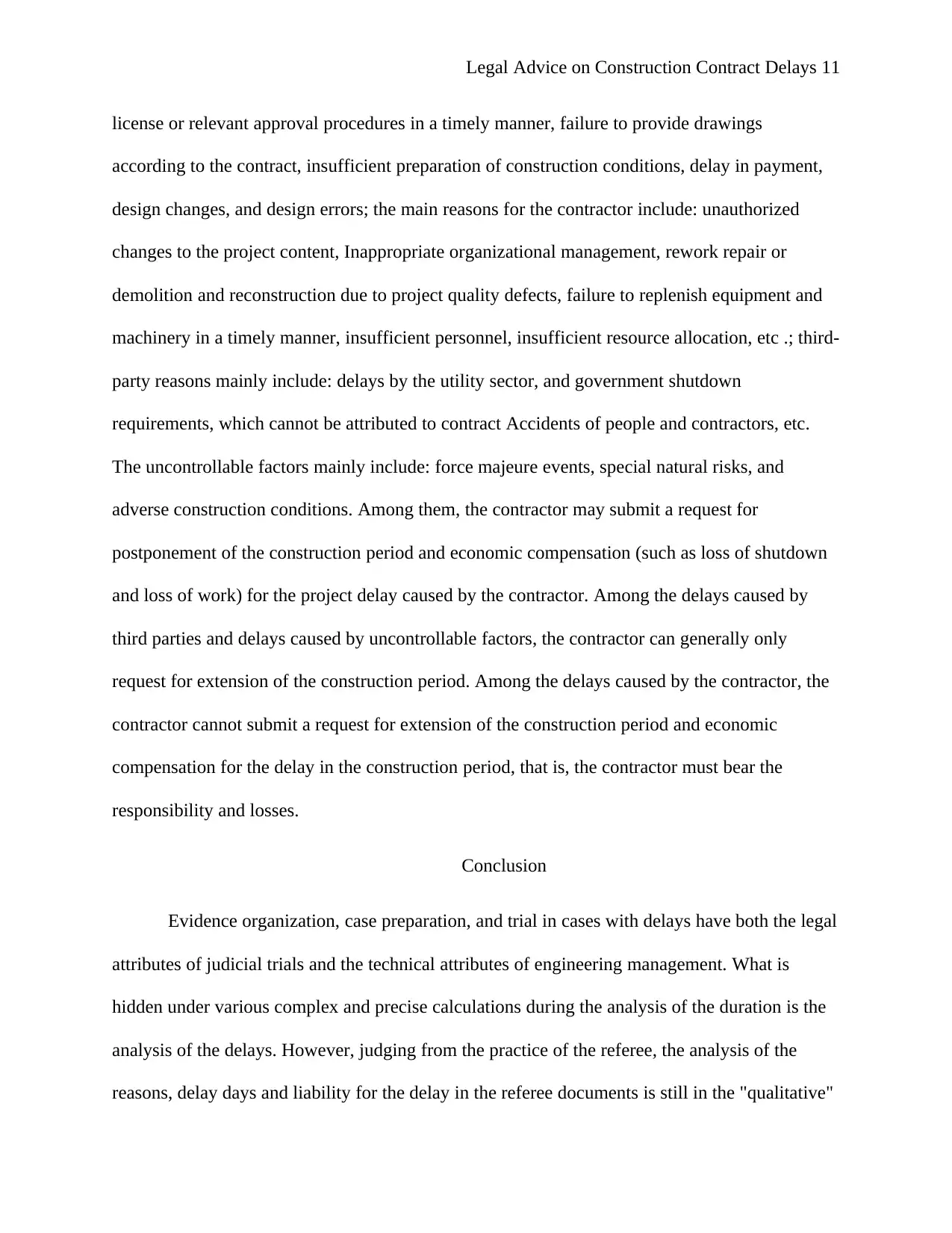
Legal Advice on Construction Contract Delays 11
license or relevant approval procedures in a timely manner, failure to provide drawings
according to the contract, insufficient preparation of construction conditions, delay in payment,
design changes, and design errors; the main reasons for the contractor include: unauthorized
changes to the project content, Inappropriate organizational management, rework repair or
demolition and reconstruction due to project quality defects, failure to replenish equipment and
machinery in a timely manner, insufficient personnel, insufficient resource allocation, etc .; third-
party reasons mainly include: delays by the utility sector, and government shutdown
requirements, which cannot be attributed to contract Accidents of people and contractors, etc.
The uncontrollable factors mainly include: force majeure events, special natural risks, and
adverse construction conditions. Among them, the contractor may submit a request for
postponement of the construction period and economic compensation (such as loss of shutdown
and loss of work) for the project delay caused by the contractor. Among the delays caused by
third parties and delays caused by uncontrollable factors, the contractor can generally only
request for extension of the construction period. Among the delays caused by the contractor, the
contractor cannot submit a request for extension of the construction period and economic
compensation for the delay in the construction period, that is, the contractor must bear the
responsibility and losses.
Conclusion
Evidence organization, case preparation, and trial in cases with delays have both the legal
attributes of judicial trials and the technical attributes of engineering management. What is
hidden under various complex and precise calculations during the analysis of the duration is the
analysis of the delays. However, judging from the practice of the referee, the analysis of the
reasons, delay days and liability for the delay in the referee documents is still in the "qualitative"
license or relevant approval procedures in a timely manner, failure to provide drawings
according to the contract, insufficient preparation of construction conditions, delay in payment,
design changes, and design errors; the main reasons for the contractor include: unauthorized
changes to the project content, Inappropriate organizational management, rework repair or
demolition and reconstruction due to project quality defects, failure to replenish equipment and
machinery in a timely manner, insufficient personnel, insufficient resource allocation, etc .; third-
party reasons mainly include: delays by the utility sector, and government shutdown
requirements, which cannot be attributed to contract Accidents of people and contractors, etc.
The uncontrollable factors mainly include: force majeure events, special natural risks, and
adverse construction conditions. Among them, the contractor may submit a request for
postponement of the construction period and economic compensation (such as loss of shutdown
and loss of work) for the project delay caused by the contractor. Among the delays caused by
third parties and delays caused by uncontrollable factors, the contractor can generally only
request for extension of the construction period. Among the delays caused by the contractor, the
contractor cannot submit a request for extension of the construction period and economic
compensation for the delay in the construction period, that is, the contractor must bear the
responsibility and losses.
Conclusion
Evidence organization, case preparation, and trial in cases with delays have both the legal
attributes of judicial trials and the technical attributes of engineering management. What is
hidden under various complex and precise calculations during the analysis of the duration is the
analysis of the delays. However, judging from the practice of the referee, the analysis of the
reasons, delay days and liability for the delay in the referee documents is still in the "qualitative"

Legal Advice on Construction Contract Delays 12
stage. And summing up the "quantitative" analysis rule of the construction period and
scientifically explaining it is the main direction for the development of judicial practice of
disputes over construction delays
stage. And summing up the "quantitative" analysis rule of the construction period and
scientifically explaining it is the main direction for the development of judicial practice of
disputes over construction delays
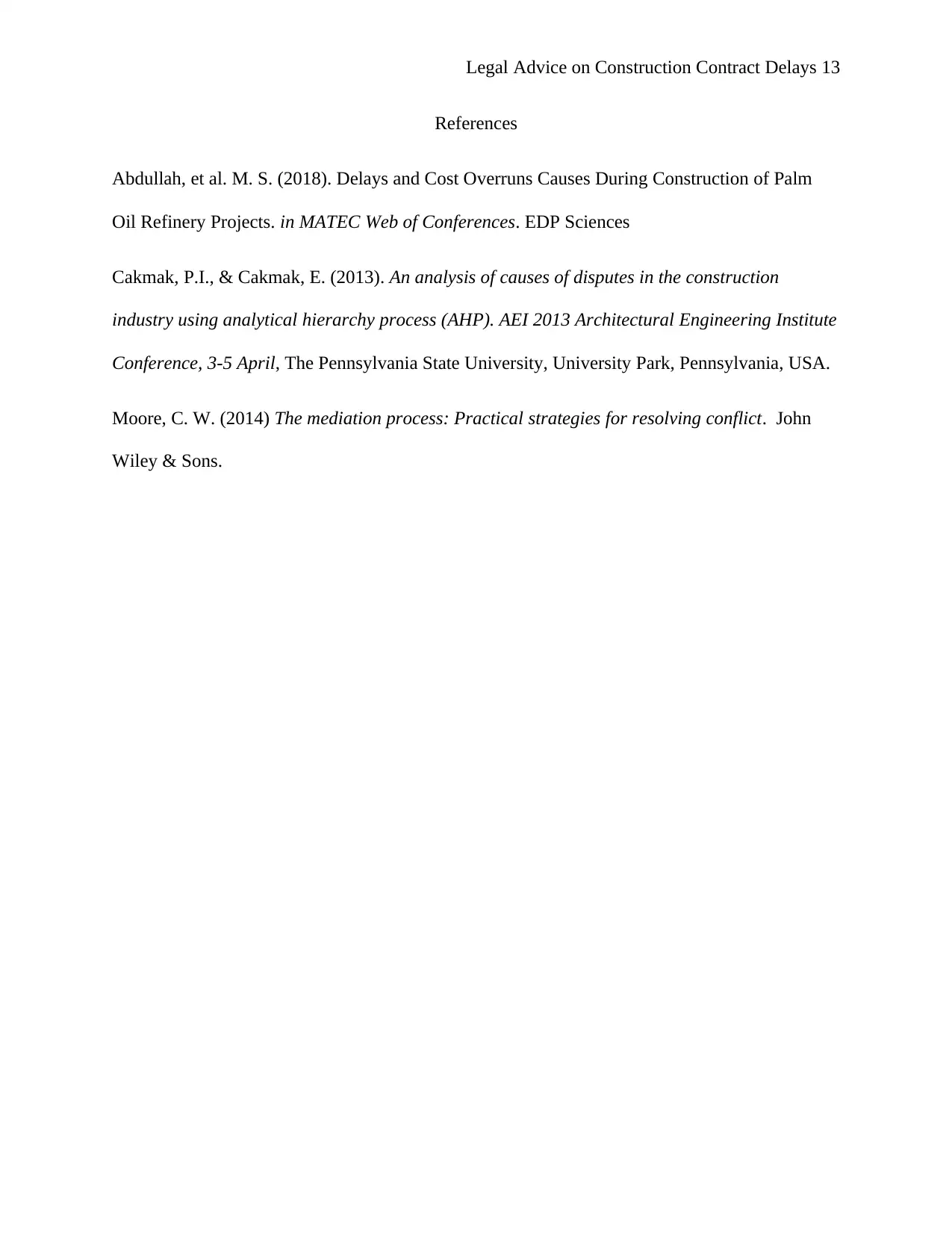
Legal Advice on Construction Contract Delays 13
References
Abdullah, et al. M. S. (2018). Delays and Cost Overruns Causes During Construction of Palm
Oil Refinery Projects. in MATEC Web of Conferences. EDP Sciences
Cakmak, P.I., & Cakmak, E. (2013). An analysis of causes of disputes in the construction
industry using analytical hierarchy process (AHP). AEI 2013 Architectural Engineering Institute
Conference, 3-5 April, The Pennsylvania State University, University Park, Pennsylvania, USA.
Moore, C. W. (2014) The mediation process: Practical strategies for resolving conflict. John
Wiley & Sons.
References
Abdullah, et al. M. S. (2018). Delays and Cost Overruns Causes During Construction of Palm
Oil Refinery Projects. in MATEC Web of Conferences. EDP Sciences
Cakmak, P.I., & Cakmak, E. (2013). An analysis of causes of disputes in the construction
industry using analytical hierarchy process (AHP). AEI 2013 Architectural Engineering Institute
Conference, 3-5 April, The Pennsylvania State University, University Park, Pennsylvania, USA.
Moore, C. W. (2014) The mediation process: Practical strategies for resolving conflict. John
Wiley & Sons.
1 out of 13
Your All-in-One AI-Powered Toolkit for Academic Success.
+13062052269
info@desklib.com
Available 24*7 on WhatsApp / Email
![[object Object]](/_next/static/media/star-bottom.7253800d.svg)
Unlock your academic potential
© 2024 | Zucol Services PVT LTD | All rights reserved.

